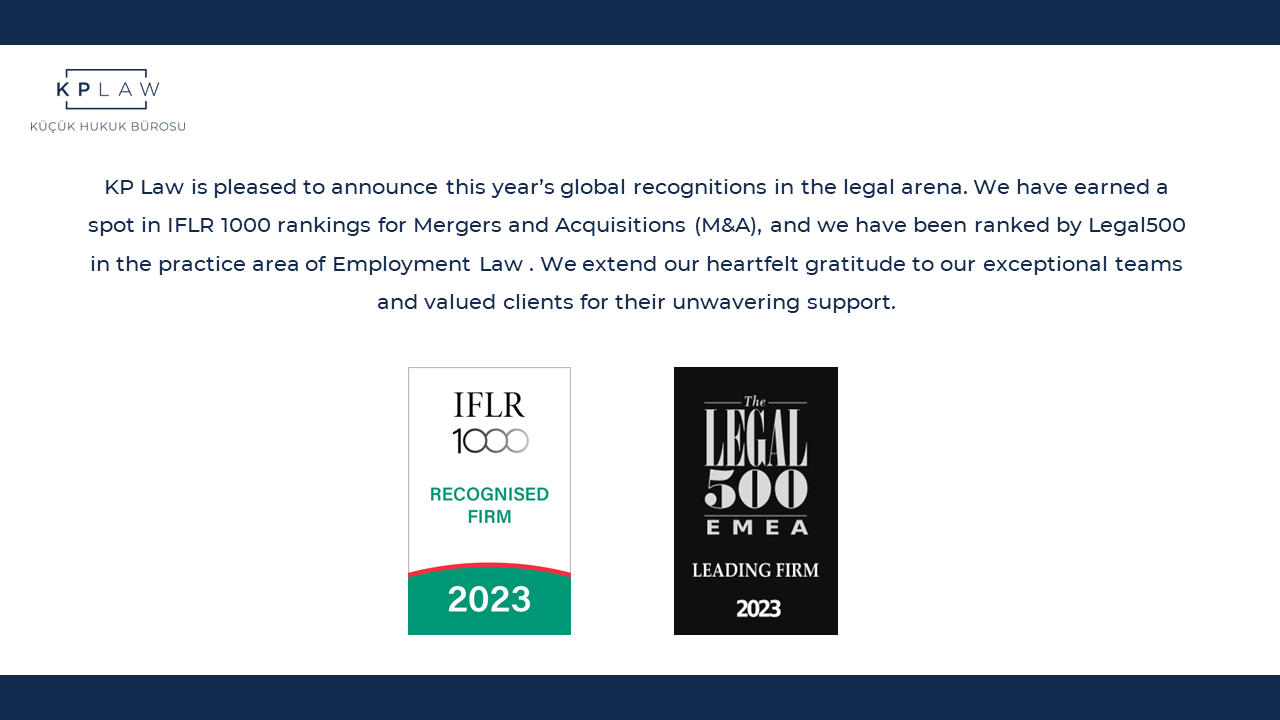News & Insights
Regulatory Approaches in the Fintech World: A Lawyer's Guide to Fintech - Part 2

Onur Küçük | MANAGING PARTNER
12.07.2023Regulatory Institutions in Turkey and Recently Implemented Regulations and Their Effects in Turkey
Financial regulations in Turkey, particularly in the recent years, have been focused on rules and laws created by the state and regulatory bodies to ensure the effective and secure operation of the rapidly evolving finance sector. These regulations address issues such as the protection of consumers in Turkey, promoting competition, preventing illegal activities, and maintaining financial stability. At the same time, it's necessary to mention the role of regulatory bodies in this context; regulatory bodies in Turkey play a significant role in maintaining financial stability, protecting investors, and delivering financial services in a safe and transparent manner. The fintech sector has grown considerably in recent years and has encouraged innovation. Therefore, it is expected that regulatory bodies will aim to support the sustainable and healthy growth of the fintech sector by closely following it and making necessary regulations.
These bodies, by establishing the laws and standards that fintech companies need to comply with, assist in fair and proper competition in the sector. In this way, enhancing the reliability and stability of the fintech sector contributes to providing better services for investors and consumers.
Regulatory Bodies
1. Banking Regulation and Supervision Agency (“BRSA”)
The BRSA is an independent public body that regulates and supervises the banking sector in Turkey. Established in 1999, the BRSA monitors the activities of banks and financial institutions, ensures the safe and transparent delivery of financial services, and ensures fair and proper treatment of customers. Furthermore, the BRSA manages risks in the sector, supervises banks' capital adequacy, and makes regulations and sets policies to protect financial stability. The Agency supports the safety and stability of the financial system in Turkey by establishing standards and regulations that banks and financial institutions must comply with. In recent years, regulations focusing on issues such as credit risk management, capital adequacy ratios, and consumer protection have been implemented by the BRSA. These regulations help banks to have a more secure and robust structure and protect consumers' rights.
One of the notable statements made by the Banking Regulation and Supervision Agency that affected the fintech and Ce-fi sector was the press release numbered 2013/32 dated 25 November 2013. According to this announcement, Bitcoin, known as a virtual currency, not issued by any official or private institution, and not guaranteed for its counterpart, is not considered electronic money due to its existing structure and operation within the scope of Law No. 6493 on Payment and Securities Settlement Systems, Payment Services, and Electronic Money Institutions. Therefore, it is not possible to supervise and regulate it within the framework of the Law on Payment Institutions.
Although the BRSA has transferred its duties and powers under the Law No. 6493 on Payment and Securities Settlement Systems, Payment Services, and Electronic Money Institutions to the Central Bank, it can be said that it is still one of the institutions that should be followed by the fintech sector in terms of its decisions and announcements.
2. Capital Markets Board of Turkey (“CMB”)
The CMB is an independent public body in Turkey responsible for the regulation, supervision, and development of capital markets. The CMB supervises transactions and activities in the capital markets, protects investors, and develops regulations and policies to ensure that markets operate transparently, fairly, and efficiently. It is also responsible for the licensing, auditing, and compliance processes of organizations in the capital markets. The primary goal of the CMB is to enhance the reliability and stability of the capital markets, thereby increasing investor confidence and supporting economic growth. Recent regulations made by the CMB include regulations made for the protection of investors and the promotion of transparency, restrictions imposed on leveraged transactions, and regulations related to the licensing processes of financial intermediaries.
3. Central Bank of the Republic of Turkey (“CBRT”)
The Central Bank of the Republic of Turkey (“CBRT”) manages monetary policy in Turkey and makes regulations to ensure financial stability. Recent regulations include interventions made to maintain stability in the foreign exchange market and changes in policy interest rates.
On April 16, 2021, the CBRT published the Regulation on the Disuse of Crypto Assets in Payments (“Regulation”) in the Official Gazette No. 31456, which came into effect on April 30, 2021. In this regulation, crypto assets are defined as “intangible assets that are virtually created and distributed over digital networks using distributed ledger technology or similar technology, but are not considered as fiat money, registered money, electronic money, payment instrument, security, or other capital market instruments”. According to this regulation, crypto assets cannot be used directly or indirectly in payments, and services for this purpose cannot be provided either.
Also, the first phase of the Central Bank Digital Currency project, the Digital Turkish Lira Project, which is carried out under the leadership of the CBRT, has successfully made the first payment transactions on the Digital Turkish Lira Network. The CBRT continues its limited scope and closed-circuit pilot application tests with technology stakeholders in the first quarter of 2023. The results of the tests are expected to be shared with the public in a comprehensive evaluation report.
The legal dimension of the Digital Turkish Lira indicates that digital identification is of critical importance for the project. Therefore, in addition to the technological requirements of the Digital Turkish Lira, it is expected that priority will be given to studies on its economic and legal framework throughout 2023.
4. Financial Crimes Investigation Board (“MASAK”)
Regulations and audits carried out to combat financial crimes and prevent money laundering in Turkey are also significant. Regulations and audits conducted by MASAK aim to provide an effective fight in this field and protect the safety of the financial system.
As the use of fintech and cryptocurrencies in Turkey increases rapidly, regulatory agencies such as the BRSA and CMB make regulations regarding the licensing and auditing processes of companies providing digital asset and payment services. In addition, regulations and audits for cryptocurrency trading platforms in Turkey are also increasing. These regulations aim to provide more transparency and consumer safety in cryptocurrency markets.
MASAK has made changes in three regulations in recent years, bringing innovations for FinTech companies. These changes include the obligation for payment and electronic money institutions to create a compliance program and the requirement to appoint a compliance officer assistant. In addition, remote identification methods were allowed to be used in establishing a continuous business relationship with real persons. The monetary amount for electronic transfers was raised, the information to be taken during the transfer was expanded, and additional rules were added. The monetary amounts taken as a basis in identification were updated, and the monetary limit values specified for simplified measures in transactions related to electronic money and payment institutions were increased.
5. Insurance and Private Pension Regulation and Supervision Agency (“SEDDK”)
SEDDK, otherwise known as the Insurance and Private Pension Regulation and Supervision Agency, is the public authority regulating and supervising the insurance and private pension sectors in Turkey. It works to ensure the safe and effective conduct of stakeholders’ activities, aiming to protect their rights and interests. Simultaneously, it establishes market order and leads the industry towards a healthy structure by contributing to the development of financial markets.
Companies operating in the field of insurtech (insurance technologies) subject to regulation in Turkey are under the supervision and control of SEDDK. This ensures that technological innovations and developments in the industry are carried out within legal frameworks, and consumer rights are protected. SEDDK continues its efforts to ensure trust and stability in insurance and private pension fields by contributing to sustainable growth and a strong structure of the industry.

